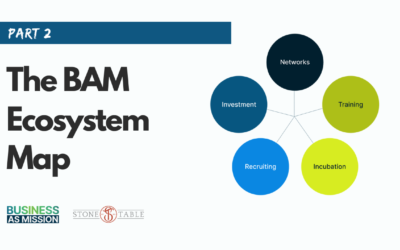The Tentmaker Trio

I am a big fan of medieval things. Medieval stories, movies, video games, and the Minnesota Renaissance Fair. Huge fan, really. My brother, his girlfriend, and I get decked out every year from swords to hats to chainmail armor, and head up to Shakopee, Minnesota and live out the next seven hours in a makeshift medieval shopping hub. It’s great.
I’m also a fan of the medieval role-playing games, which are games where you choose a “class” to play as in the context of a medieval world. Each class will have certain benefits or perks and usually has some downsides as well. In the beginning, each player will choose their class and enter the game (video game or otherwise). Typically, your choice of class will determine what kind of playstyle you have or what opportunities you may capitalize on throughout the game.
I’m going to use this example to portray three different attitudes of tentmakers and how they may view or approach their own tentmaker ministries. I shall call this: “The Tentmaker Trio”. We will take a brief look at some perks and some downsides to each class and sum up with God’s relationship to all of them.
The Tenacious Tentmaker: “Go Get It”
The first class we will examine is the “Tenacious Tentmaker”. This character is typically an ambitious go-getter that is ready to roll out before a moment’s notice and is expectant for God to provide as they take their steps.
(+) Perks: bold, fast-paced, makes things happen.
(-) Detriments: higher risk, potentially unprepared.
This is an interesting class; one I probably aligned with the most up to several months ago. This class will typically put “faith first” and logic second. I don’t see this as a negative feature, but rather a feature that differentiates them from the other tentmaker classes.
These tentmakers will expect a great move of God as they leap towards their goal & aspirations for His kingdom. I think of Jonathan. In 1 Samuel 14, Jonathan is standing with his father Saul, the king, and a small army of Israelites as they prepare to face off against a much greater Philistine army. Saul and the priest are doing… well, nothing, and the people are losing hope. Jonathan, on a whim of faith, makes a voraciously bold statement to his armor-bearer and says,
“Come, let us go over to the garrison of these uncircumcised. It may be that the LORD will work for us, for nothing can hinder the LORD from saving by many or by few.” (1 Samuel 14:6, ESV).
So, to clarify, he’s basically saying, “God might work for us if we get up and do this, so let’s just rip it and see what happens.” I think his statement of, “for nothing can hinder the LORD from saving by many or by few” is a true declaration of his faith in God – for he knows that nothing can stop what the LORD determines to do, regardless of the odds. He almost sounds like Han Solo there saying, “Never tell me the odds!”
Yes, I’m totally nerding out this article.
Long story short, the boys get up there and defeat the Philistines with just the two of them. With their leap of faith, the LORD delivers the Philistines into their hand without ever promising it to them beforehand. They just up & went at it, and the LORD prevailed. This is the tenacious tentmaker – one that gets up & goes and says, “nothing can hinder the LORD from doing this whether with more than what I have or with only what’s in my hands”.These tentmakers just want to go.
The Patient Tentmaker: God Will Open the Door
Following that, the second class we will examine is the “Patient Tentmaker”. This character typically functions on patience first (go figure) and waits for God to open the perfect door before advancing.
(+) Perks: less risk, more confidence, greater preparation & provision.
(-) Detriments: slower pace/longer waits, may miss some shorter-term opportunities.
Here I think of Paul. While Paul totally embodied a ton of the “Tenacious Tentmaker” persona, I think he also has a prime example of being a “Patient Tentmaker” as well.
In Acts 16:6-10, Paul & co. were running their rounds across the known world preaching the Gospel. Yet, in more than one instance, the Holy Spirit (or “Spirit of Jesus”) kept or prevented them from entering certain places they wanted to go to. This was an example of a “Patient Tentmaker” moment, where Paul had to be in tune to the Spirit of God and listen patiently for where that door would open. The tentmaker & his crew stopped in Troas after those doors closed, and as Paul was sleeping, he received a vision from God to go to Macedonia. God had opened the door, and it was time to go.
While Paul may have missed out on where he wanted to go initially, he was able to move forward to where God specifically wanted him to go and could therefore do so with more confidence, knowing that the door had been opened for him to preach there. This is an example of the patient tentmaker – the one who waits for the Lord to open the door.
The Scrupulous Tentmaker: By the Book
Finally, our third class is the “Scrupulous Tentmaker”. This class examines more frequently how things “ought” to be done and follows them to the T. Have you guys ever worked with someone that was always “our policy is…” and never making an exception? That’s the kind of vibe we’re looking at here.
(+) Perks: always in line with the rules, ordered, structure.
(-) Detriments: may box themselves in or limit how God wants to move.
While I may think more easily of a Pharisee keeping the law, I will draw more attention to Samuel the priest. Samuel knew the order of things – he was a priest and had been consecrated for service to God since he was born (literally). He knew things had to be done in proper order according to God, such as offering the sacrifice before a battle, and this had to be done by the priest, not just by anyone.
In 1 Samuel 13, King Saul was following his instructions to wait for Samuel’s arrival to sacrifice to the LORD before battle. Unfortunately, Saul was a negative example of the “Tenacious Tentmaker”, and Samuel, being the “Scrupulous Tentmaker” and God’s chosen prophet, had a tough time working with him. In fact, he really didn’t have room to “work with him” at all.
Saul pressed himself forward after Samuel was delayed, giving in to his circumstantial pressure, and offered the sacrifice outside of God’s will & timing. Being the perfect example of the risk of being the “Tenacious Tentmaker”, Saul now found himself in a place of blatant arrogance and had to present himself to Samuel upon his arrival.
Samuel, and the LORD, were greatly displeased with Saul, and Samuel informed Saul that he had now lost the kingdom because of his rash disobedience and failure to keep the commands that God had put in place.
To really shorthand the role of the prophet, they were there to keep the king & kingdom in line with God’s will. They were the supervisor; the one underneath the manager (God), but above the employees (people). Samuel was the scrupulous tentmaker, who followed the [written] will of God to the T.
Conclusion: Which Tentmaker Are You?
I hope that through examining each class of tentmakers, you have also found that there are good things in each of them as well as downsides. The point is, we need a little of all of them.
There is a lot of gray area for theological perspectives here, but we know that our faith influences God and that He responds to it. However, faith can look different in different seasons or even in different people. While some of us may be more like the “Tenacious Tentmaker”, willing & wanting to jump the cliff-like Jonathan, some of us may be way more comfortable hanging back with Paul and choosing to take the “Patient Tentmaker” route.
I think there are seasons for each: some for the “Tenacious Tentmaker” to be patient, some for the “Patient Tentmaker” to be tenacious, and even seasons for all three classes to be bold, patient, or inflexibly obedient depending on the circumstances and what God is speaking to them.
In the end, your tentmaker ministry is in God’s hands, which means your number one role, whatever class you choose, is to be in tune to His Spirit and what He is speaking to you.
Which class do you think you are?







